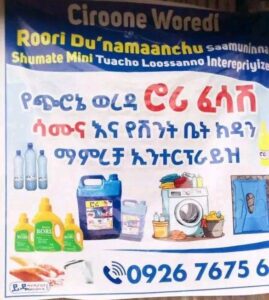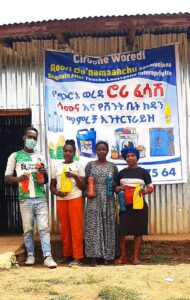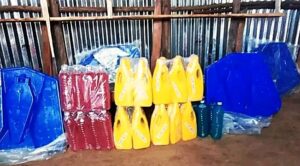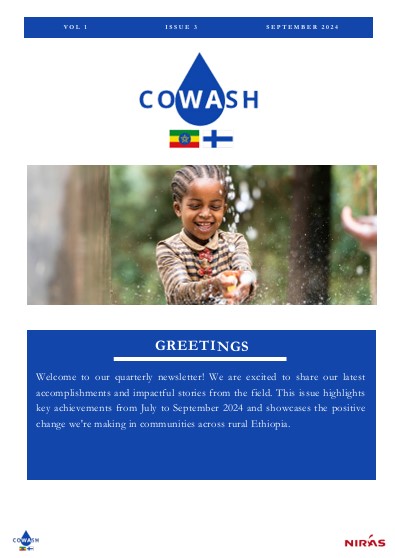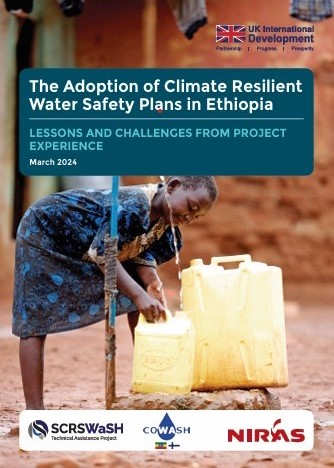Simple Handwashing Saves Lives: Promoting Handwashing Practice in Rural Ethiopia
Simple Handwashing Saves Lives: Promoting Handwashing Practice in Rural Ethiopia
Every year, the world celebrates Global Handwashing Day to highlight the importance of this simple yet effective practice in preventing the spread of diseases. In rural Ethiopia, where access to basic hygiene services is limited, inadequate handwashing poses significant health risks, particularly among children. On this year’s Global Handwashing Day, we explore the importance of handwashing and how COWASH IV is contributing to improved handwashing practices in these communities.
Why are clean hands important?
Handwashing with soap is a simple yet effective way to prevent a range of diseases and the spread of infections. As Amarech Zemede, a health extension worker at Untelo Health Post in Gacho Baba Woreda, one of COWASH IV’s project areas in South Ethiopia, emphasizes, handwashing is a cost-effective and essential practice for protecting ourselves from diseases caused by poor hygiene. Studies also show that handwashing with soap can reduce diarrheal diseases by 30% and acute respiratory infections by up to 20%.
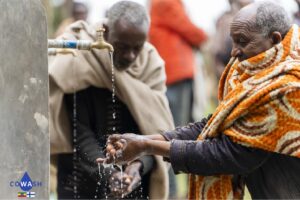 Moreover, proper hand hygiene is linked to various benefits including reduced school absenteeism, improved wellbeing, dignity and productivity. Yerom Demisse, a health extension worker at Zemeten Health Post in Dejen, another project woreda of COWASH IV in Amhara Region, shares that handwashing has contributed to improved school attendance in her community. She says “children were previously absent due to poor hygiene and frequent visits to the health post.”
Moreover, proper hand hygiene is linked to various benefits including reduced school absenteeism, improved wellbeing, dignity and productivity. Yerom Demisse, a health extension worker at Zemeten Health Post in Dejen, another project woreda of COWASH IV in Amhara Region, shares that handwashing has contributed to improved school attendance in her community. She says “children were previously absent due to poor hygiene and frequent visits to the health post.”
Handwashing is also part of the Sustainable Development Goals where promoting high levels of hand hygiene practices can contribute to their achievement.
Despite its importance, handwashing practices in rural communities remain at an early stage and require further attention. Ebsa Feyisa, COWASH IV’s social and behavioral change specialist, notes that even with those communities who have handwashing facilities, the availability of soap is a significant challenge.
COWASH IV: Promoting handwashing in rural Ethiopia
One of the focus areas of COWASH IV, a bilateral project between Ethiopia and Finland, is to improve handwashing practices in rural communities. The project promotes handwashing through three key initiatives: demand creation, developing and an enabling environment and financial and supply access.
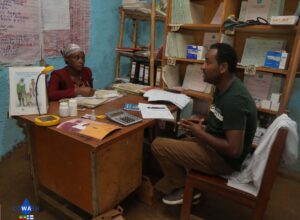 According to Ebsa, while awareness of handwashing has increased, there is still a gap in applying this knowledge due to negligence and beliefs that discredit its importance. COWASH IV is implementing different social and behavioral change programs to address these challenges and promote handwashing. Among others, the project provides training programs and supervision support to health extension workers to influence communities and reinforce positive behavior. Particularly the on-the-job training program for health extension workers and other stakeholders makes COWASH IV’s intervention unique.
According to Ebsa, while awareness of handwashing has increased, there is still a gap in applying this knowledge due to negligence and beliefs that discredit its importance. COWASH IV is implementing different social and behavioral change programs to address these challenges and promote handwashing. Among others, the project provides training programs and supervision support to health extension workers to influence communities and reinforce positive behavior. Particularly the on-the-job training program for health extension workers and other stakeholders makes COWASH IV’s intervention unique.
Amarech highlights this instrumental role of the project in supporting her team’s effort to raise awareness and promoting handwashing in her community. Her team implement various activities to encourage handwashing, including house-to-house visits, school-based interventions and teaching at various community events. She says the project’s training programs and supervision support for health extension workers have been crucial in enabling them to effectively deliver these works. These combined efforts have led to a noticeable improvement in the community’s hygiene practices, particularly among children, says Amarech.
Yerom agrees with Amarech expressing her joy to observe a positive change in her community. “Many children used to visit our health post due to illnesses related to poor hygiene and we would often carry oral rehydration therapy and zinc during our house-to-house visits” shares Yerom. However, the situation has improved, with fewer people reporting similar problems to her health post following the interventions. For Yerom, the project’s work in providing communities with safe water supply along the training programs has played a crucial role in promoting handwashing.
COWASH IV is also promoting handwashing through communication interventions that aimed at ensuring practical implementation. The project has developed and disseminated posters that raise awareness and promote handwashing in public service areas such as health posts, schools and Kebele administrations. Additionally, the project has produced and distributed audio and video messages through social media, available websites, local TV stations and radio channels. These educational materials are available in three local languages: Amharic, Afan Oromo and Sidaamu Afoo.
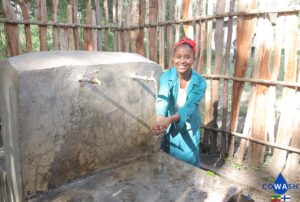 COWASH IV’s second intervention area aims to create an enabling environment. The project collaborates with partners at various levels, from national to kebele, to establish an enabling environment for handwashing promotion. This involves participating in developing roadmaps and guidelines at the national level and providing support to government systems, including the health extension program.
COWASH IV’s second intervention area aims to create an enabling environment. The project collaborates with partners at various levels, from national to kebele, to establish an enabling environment for handwashing promotion. This involves participating in developing roadmaps and guidelines at the national level and providing support to government systems, including the health extension program.
COWASH IV also provides comprehensive WASH interventions in schools and health posts. In addition to constructing water schemes and improved latrines, the project has built dedicated handwashing facilities in schools and health posts. These efforts, combined with awareness-raising activities, encourage students to wash their hands and influence their families.
Million Wolde Giyorgis, a health extension worker at Wegencho Kebele Health Post in Yezm Zone, Central Ethiopia, highlights the positive impact of a water point constructed by COWASH IV in 2015. Prior to the water point, the lack of clean water made daily tasks, such as handwashing for procedures like inserting birth control implants, significantly more challenging.
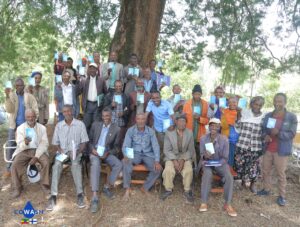 The third focus area of COWASH IV’s handwashing intervention is creating financial and supply access for rural communities. To achieve this, the project is establishing market-based sanitation centers and facilitating the establishment of WASH savings and loan associations (SLAs). The sanitation centers offer affordable sanitation supplies, including liquid soap. WASH SLAs, on the other hand, provide communities with financial access to purchase and install handwashing facilities along with improve household latrines.
The third focus area of COWASH IV’s handwashing intervention is creating financial and supply access for rural communities. To achieve this, the project is establishing market-based sanitation centers and facilitating the establishment of WASH savings and loan associations (SLAs). The sanitation centers offer affordable sanitation supplies, including liquid soap. WASH SLAs, on the other hand, provide communities with financial access to purchase and install handwashing facilities along with improve household latrines.
Demissie Menegesha, a resident of Chirone Woreda, where COWASH IV established a market-based sanitation center, highlights the positive impact of the centers in providing high-quality soap at an affordable price which in turn is improving handwashing practice.
Handwashing is a simple yet powerful tool in preventing diseases and improving health outcomes in rural Ethiopia. COWASH IV’s comprehensive approach, which includes demand creation, financial and supply access, and an enabling environment, is making a significant impact. By addressing challenges and promoting behavior change, COWASH IV is helping to ensure that clean hands save lives in rural communities.
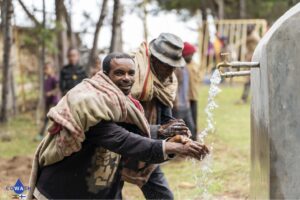
COWASH IV: Advancing WASH in Central and South-West Ethiopia
Central and South-West Ethiopia joined COWASH IV as a distinct region in the 2023 following the regional restructuring that established the regions. COWASH IV seamlessly adapted to the changes and signed Memorandum of Understanding with the regional Finance Bureaus providing a solid foundation for uninterrupted project activities.
In Central Ethiopia, COWASH IV works in seven woredas; Lemo and Soro in Hadiya Zone; Abeshige and Geta in Gurage Zone; Hadero Tunto in Kembata Zone; Fofa in Yem Zone and Temebaro Special Woreda. In South-West Ethiopia, the project works in two woredas, Kechi and Mari Mansa in Dawro Zone. The project started working in these woredas in 2021 while they were under the previous South Nation and Nationalities and People’s Region.
In both regions, COWASH IV has taken significant steps in improving WASH services since 2021. The project has facilitated the construction and rehabilitation of 115 water points in Central Ethiopia, benefiting around 60,163 people. In South-West Ethiopia, 42 water points have been constructed, serving 10,251 individuals.
Furthermore, COWASH IV has invested in school WASH facilities, providing clean water to 24,161 students and school staff in Central Ethiopia and 1,674 students and staff in South-West Ethiopia. To promote hygiene and improve healthcare delivery, the project has supplied water to 29 health facilities in Central Ethiopia and four in South-West Ethiopia.
Additionally, COWASH IV has constructed improved latrines in schools and health posts, promoting sanitation and reducing the risk of disease transmission. In Central Ethiopia, Menstrual Hygiene Management Centers have been established in two schools, creating a more conducive learning environment for girls.
The project has also fostered financial empowerment through WASH Savings and Loan Associations and delivered capacity-building training to thousands of people, strengthening community resilience. In Central Ethiopia, over 6,600 people have received training, while in South-West Ethiopia, the number is over 1,100.
COWASH IV’s efforts in Central and South-West Ethiopia have significantly contributed in improving the lives of communities by increasing access to clean water, sanitation, and hygiene services. These advancements have contributed to better health outcomes and improved education.

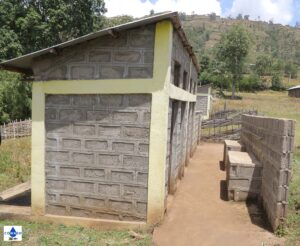
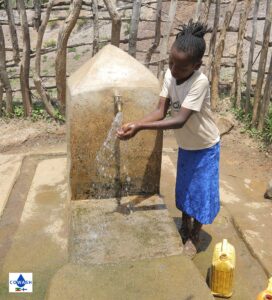
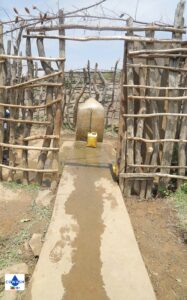
Overcoming WASH Challenges: A Success Story from Abaye Boreta, Ethiopia
Many communities continue to struggle with a lack of safe water and sanitation services. Climate change, environmental degradation, water contamination, and operational limitations are among the primary challenges hindering the sustainable provision of adequate WASH services. COWASH IV is working to address these challenges through its water safety plans, a comprehensive approach that encompasses all steps in the water supply chain, from source to point of use.
COWASH IV’s work in Abaye Boreta Kebele serves as a prime example. The Abaye Boreta Spring Water Supply System in Wondo Genet Woreda previously faced severe challenges, including floods, contamination, and infrastructure damage. Serving a community of 2,900 people across 580 households, the water supply system was initially constructed in 1997 and underwent a crucial reconstruction in May 2024 under the COWASH IV project. Through a comprehensive risk assessment and targeted solutions, COWASH IV achieved significant improvements.
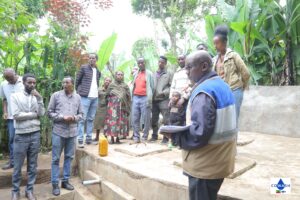
The project reconstructed the spring capping structure, built flood diversion ditches, and ensured safe water access for the community. It also addressed contamination issues through community education and infrastructure upgrades. These measures have enabled the creation of a resilient water system capable of withstanding future climate shocks, particularly by mitigating flood risks to the spring source.
COWASH IV conducted a follow-up visit to the water source from August 7-8, 2024. The project team met with community members, local government officials, project staff, and experts to assess the project’s outcomes and identify any remaining challenges.
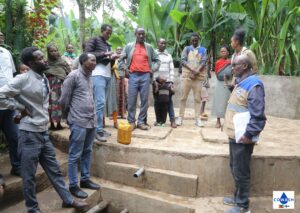
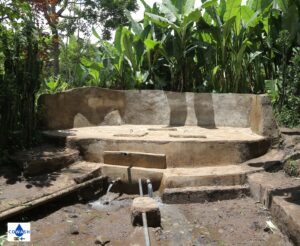
COWASH IV: Empowering Women to Lead WASH Initiatives
Women play a critical role in managing water resources and ensuring the health and well-being of their communities. Recognizing this, COWASH IV is committed to empowering women to take leadership positions in WASH facilities construction and management.
Through its Community Managed Project (CMP) approach, COWASH IV places decision-making power directly in the hands of communities. At the heart of this model are WASH Committees (WASHCOs), which are responsible for planning, implementing, and managing WASH projects. The project prioritizes the inclusion of women in WASHCOs, aiming for at least 50% female membership and encouraging communities to select women with the necessary skills and knowledge for leadership roles.
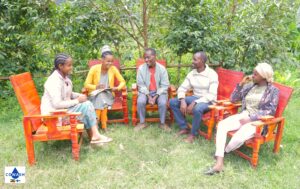 COWASH IV provides comprehensive training on leadership and the CMP approach to equip women with the necessary skills to excel in their roles. The project also develops and distributes guidelines and manuals to support their work.
COWASH IV provides comprehensive training on leadership and the CMP approach to equip women with the necessary skills to excel in their roles. The project also develops and distributes guidelines and manuals to support their work.
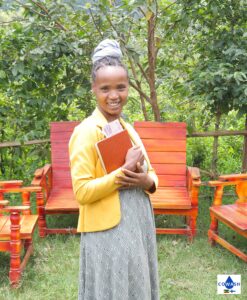 Mestawet Mengistu, a treasurer from the Abaye Boreta Community Water Supply WASHCO in Wondo Genet Woreda, highlights the positive impact of this approach on her leadership development and community involvement. She emphasizes the importance of empowering women to participate in such committees, enabling them to address their challenges directly and develop their skills.
Mestawet Mengistu, a treasurer from the Abaye Boreta Community Water Supply WASHCO in Wondo Genet Woreda, highlights the positive impact of this approach on her leadership development and community involvement. She emphasizes the importance of empowering women to participate in such committees, enabling them to address their challenges directly and develop their skills.
The WASHCO from Abaye Boreta is currently responsible for administering the Abaye Boreta Spring Water Supply System and working to build a community water point that will benefit 67 households. The committee holds regular meetings, collects monthly contributions, and maintains a savings account. They also actively promote awareness about hygiene, and the benefits of community water points, and encourage community contributions for WASH projects.
Empowering women as WASHCO leaders is crucial for the sustainable management of community water points. Women often bear the primary responsibility for water collection in rural communities and possess a deep understanding of water needs and challenges, making them ideal advocates. Their involvement in WASHCOs ensures that water supplies are managed effectively, with close attention to maintenance and repair, guaranteeing the sustainability of community water points. Moreover, by taking on these leadership roles, women gain valuable experience, positioning them for future leadership opportunities within their communities and beyond.
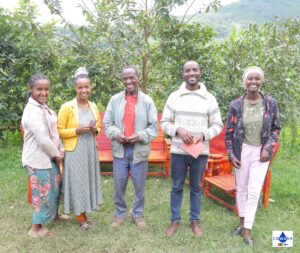 Abebayheu Campa, a member of the Abaye Boreta WASHCO, shares her experience of developing her leadership skills through her involvement in the committee. She appreciates the project’s community-led approach, which has empowered her community to effectively address their WASH needs.
Abebayheu Campa, a member of the Abaye Boreta WASHCO, shares her experience of developing her leadership skills through her involvement in the committee. She appreciates the project’s community-led approach, which has empowered her community to effectively address their WASH needs.
Beyond water points, COWASH IV promotes women’s leadership in WASH Savings and Loan Associations and Market-Based Sanitation Supply Centers programs. The project requires membership and encourages women to take on leadership roles in these initiatives, fostering women’s empowerment and creating opportunities for women-led businesses in the sanitation sector.
A prime example of this initiative is the Roori Market-Based Sanitation Supply Center (MBSC) in Sidama’s Chrione Woreda. The MBSC has three women among its five members, with two of them in leadership positions. The project provided training for the members, helping them to develop their leadership skills and effectively address the sanitation supply needs of the community.
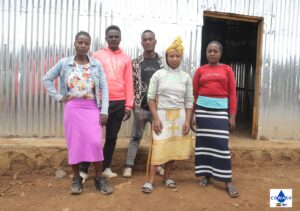
Roori MBSC: Empowering Rural Communities with Affordable Sanitation
Roori, which was successfully launched in April this year, is a market-based sanitation supply center (MBSC) in Sidama’s Chrione Woreda. It was established by COWASH IV in collaboration with Sidama Regional Government in the 2015 Ethiopian Fiscal Year.
COWASH IV organized the five founding members into a group and equipped them with essential skills through comprehensive training. The project also constructed the production and supply center for the group and provided initial startup supplies to kickstart operations. The Sidama Regional Government provided land for the construction of the center.
Now fully operational, the Roori MBSC is making a significant impact by producing and supplying affordable sanitation products to the community. The center manufacture liquid soap (detergent) and improved toilet slabs. Roori MBSC also participated at the Sidama Regional States Job, Skill and Enterprises Development Bureau exhibition. This six-day event, which concluded on July 9, 2024 in Hawassa, provided a platform for local enterprises to showcase and sell their products.
Demissie Menegesha, a resident of Kebele 01 in Chirone Woreda, is happy with the impact of the Roori MBSC. “The center provides us with high-quality soap at an affordable price,” he says. “This has made liquid soap easily accessible for essential hygiene practices like handwashing.
Belaynesh Botola, a treasurer at the center, explains that the center has been operating smoothly since its launch. “We are grateful to COWASH IV,” she says. “Unemployment was a huge challenge, but this center has given us financial independence.” Niguse Dale, the secretary of the Center, shares Belaynesh’s gratitude for the support from COWASH IV and the Woreda Job and Skill Enterprise Office. “We’re experiencing high demand from the community,” he explains. “Our goal is to continue growing and expanding our reach.”
Mulatie Yinager, COWASH IV’s Medium and Small Enterprise and Microfinance Institutions Specialist, highlights the significant contribution of the MBSC to the community by supplying sanitation and hygiene products, particularly liquid soap, which is in high demand. Mulatie, who visited the center at the beginning of July this year, also observed the active involvement of female members in the production process and believes the group can serve as role models for other youth, demonstrating the sector’s potential.
Adisu Asefa, COWASH IV’s Medium and Small-Scale Enterprises Focal Person at the Chirone Woreda Job and Skill Enterprise Office, echoes Mulatie’s sentiments. He emphasizes the transformative impact of the center on its members, who were unemployed with their team leader holding a university degree and the rest having completed high school. Beyond benefiting the members, Adisu notes that Roori has made a substantial contribution to improving household hygiene in the community by providing affordable liquid soap.
To ensure the MBSC’s long-term success, COWASH IV provided on-the-job training (OJT) to its members and concerned woreda experts on July 2, 2024. This training focused on crucial skills, including market promotion strategies, sustainable cash management, supply chain linkage, business transaction record keeping and establishing linkages with WASH Savings and Loan Associations (SLAs).
Roori MBSC is one example of COWASH IV’s commitment to empowering local communities to achieve sustainable WASH services. As one of the 20 MBSCs established by COWASH IV across various project regions, it demonstrates the project’s focus on fostering sustainable WASH markets through private sector engagement and innovation. By empowering local communities and fostering sustainable businesses, COWASH IV is paving the way for a healthier future in rural Ethiopia.
